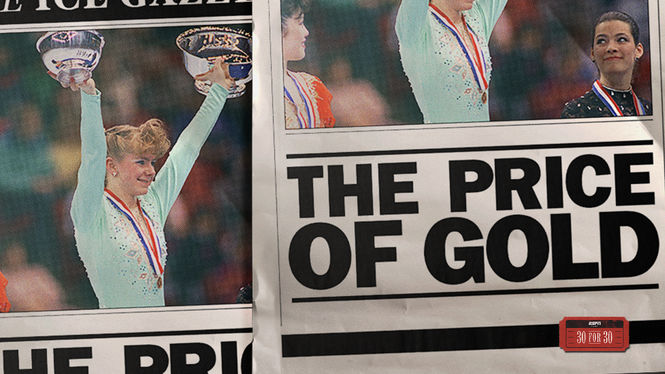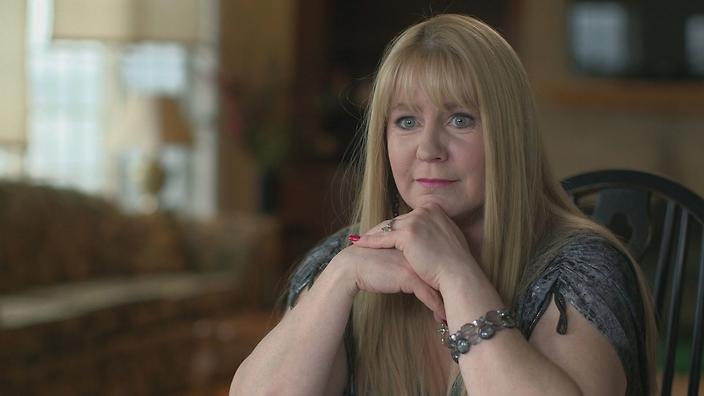Doc Corner: 'The Price of Gold' Brings Clarity to 'I, Tonya'
 Monday, February 12, 2018 at 10:45AM
Monday, February 12, 2018 at 10:45AM By Glenn Dunks

The defining trait of I, Tonya that has separated it from a glut of biopics is that darkly comedic tone achieved significantly through fake direct-to-camera interviews by an assortment of ghoulish villains and anti-heroes. One could argue that with its cast of monstrous characters and flamboyant yet true-to-life costumes and wig-work, the film’s mock documentary device was entirely unnecessary at achieving its desired laughs.
Yet while I saw the value of its method as a sort of short-hand directorial device used to wrangle the story’s many real life contradictions and he-said-she-said-he-said-she-said-he-said narrative, having watched Nanette Burstein’s sublime The Price of Gold, it comes off as actually just lazy...
Burstein was an Oscar nominee in 2000 for another sporting doc, On the Ropes, directed alongside Jane director Brett Morgen, but she is perhaps best known for The Kid Stays in the Picture, another collaboration with Morgen. Made for ESPN’s 30 for 30 series – the very same that gave us the Oscar-winning O.J.: Made in America – its actually quite surprising that the story of Tonya Harding and Nancy Kerrigan that so dominated headlines in 1994 hadn’t been the focus of a documentary before this 2014 release.
Watching Burnstein’s film and I couldn’t help but spot its influence on I, Tonya in quite glaring ways. So much so that I am surprised nobody saw fit to query its status as an original screenplay like they (rightfully) did with Loving last year. Simply claiming the film was adapted from the documentary would have surely snagged them an easy screenplay nomination in the process.
It’s not just that the two films follow the same story. In fact, the two occasionally veer of onto their own tangents – I, Tonya, for instance, focuses much more heavily on the domestic violence angle, whereas The Price of Gold prefers to play up the issue of class (or perceived class considering the Kerrigan family was not as wealthy as most assumed) within the rivalry of Harding and Kerrigan. Likewise, Kerrigan looms larger over the proceedings of the doc than the Margot Robbie starrer and while she herself does not appear, her husband and coach do, while one passage of the doc charts Kerrigan’s rehab efforts in the lead up to the 1994 Winter Olympics.
The doc also offers up a boon of archival footage that was surely a powerful part of I, Tonya’s look. For instance, another documentary filmed by a friend of Harding at age 15 that includes the only recorded video of Harding’s mother, LaVona, in her now famous fur coat and bird on the shoulder is a major highlight. The use of other archival footage including skating competitions, the Olympics, and the abundance of network and cable news outlets who latched onto the story in the post-O.J. void of the 24-hour news cycle allows The Price of Gold to capture the truly crushing, maddening, exhausting atmosphere that I felt Gillespie’s film was sloppy in presenting. This is aided by appearances by the likes of Connie Chung who John Powers who offer light and shadow to the media circus they became a part of – Chung even throwing some delightful shade to the likes of the New York Times in the process.

Whatever my gripes about I, Tonya, however, I continue to give major props to Margot Robbie whose successes in the part are only more impressive after watching the documentary. Tonya’s defiance at her lack of wrongdoing proves to be a powerful cinematic aphrodisiac in both instances. And while I think I, Tonya takes too much of an influence from the documentary’s talking head interludes, it’s easy to see why it would.
Both the doc and the fictional film never seem entirely convinced of Harding’s innocence. Nor should they, really, although Gillespie’s film seems more willing to take her at her word. Nevertheless, her attitude as the hard-done-by girl from the wrong side of the tracks is an uncannily smart one that has remained effective in shifting the narrative in a way that would make Donald Trump and the Republicans proud. It’s perhaps little surprise to learn that Harding herself is a Trump supporter (albeit one without the privilege to vote for him). I liked the way Burstein’s film leaned more heavily into the issue of her guilt or innocence in its closing passages without the irony and that’s ultimately what I think makes The Price of Gold the stronger film and the more worthwhile depiction of Harding, Kerrigan and the entire sordid affair.
 Doc Corner,
Doc Corner,  I Tonya,
I Tonya,  Olympics,
Olympics,  Reviews,
Reviews,  documentaries,
documentaries,  politics
politics 


Reader Comments (14)
"Both the doc and the fictional film never seem entirely convinced of Harding’s innocence. Nor should they, really, although Gillespie’s film seems more willing to take her at her word."
Huh. That's weird - a lot of people are saying the opposite. I, Tonya DOES seem to let Harding off the hook pretty easily. If this doc is even easier on her, then it must be pretty lightweight treatment of her involvement.
"…although Gillespie's film seems more willing to take her at her word."
Sorry, but that's absurd. The documentary depicts the real-life Tonya but gives her enough proverbial rope to hang herself. Tonya comes across as a shifty, unreliable interview subject—far from the dim, earnest, redneck Pollyanna Robbie is playing. Part of documentary filmmaking is allowing sketchy liars to look like sketchy liars.
I, Tonya's emotional climax (the courtroom scene) is probably the most egregious part of the entire movie. Robbie sobs and says she's rather take jail time than be banned from skating. That is unequivocally false. Harding pled guilty (and accepted the terms of a plea deal) to avoid going to trial and facing jail time. The way it plays is dishonest, revisionist fantasy. No judge hoodwinked her in sentencing...she and her attorneys accepted that exact deal.
I had a problem with the courtroom climax too as it's fiction. She agreed to the plea deal to avoid jail time, so to portray it as a tragic miscarriage of justice is just revisionism. Forget about unreliable narrators, this is unreliable filmmaking.
I saw that documentary a couple of years ago as I was intrigued by it and found myself siding with Tonya Harding as I don't think she had anything to do with that attack on Kerrigan. Plus, I think she comes off as someone humble and really willing to answer questions she's been asked a bunch of times.
Plus, I'm kind of glad I, Tonya is doing well as it's given Harding some redemption as she recently got interviewed on a skating rink still has it. She may not jump as high as she used to but she's still got a flawless technique. Figure skating needs her.
DJDeeJay, no what I am saying is that I, TONYA seems more willing to believe Harding's own word that she's innocent. The documentary definitely appears more skeptical as to that. Gillespie directed I, TONYA. I TONYA is, indeed, as you say, too lenient on Harding. Hence "taking her at her word".
Hayden, your issues appear to be with I, TONYA more than the documentary. I'm not sure what about the line you quoted implies I think the documentary does NOT present her as sketchy and an unreliable narrator type. I am saying Gillespie (the director of I, TONYA) is more willing to believe her innocence than the documentary. The dim earnestness you see in Robbie is a dramatic film's version of her being so convinced of her innocence that she truly believes it.
"I am surprised nobody saw fit to query its status as an original screenplay like they (rightfully) did with Loving last year. Simply claiming the film was adapted from the documentary would have surely snagged them an easy screenplay nomination in the process."
I'm glad you mentioned this. I'm still surprised and confused on why the hell I, Tonya (or The Post too) never tried to switch over to Adapted Screenplay.
It probably has a lot to do with obtaining rights and maybe a little about pride. I can imagine for a writer to claim that their script is wholly written through their own research and imagination is a more flattering view than adapting someone else's work.
Oh for sure. They have to give them money and credit and it's a long process. It's just curious because they all clearly watched the film (and have said as much) and calling it adapted would have made it so easy to be nominated for screenplay (which, to be fair, is not usually the case in the adapted side).
I honestly can't believe I, Tonya isn't considered an Adapted Screenplay because of how much of the material feels lifted from The Price of Gold.
Why is a surprise that Tonya Harding would vote for Donald Trump? Because she's a woman?
I'm so glad to hear someone else thought of this documentary while watching I, Tonya. There structural similarities were very jarring to me, though I found the film's willingness to forgive Tonya ultimately very frustrating. Tonya emerges as such a loathsome, delusional narcissist throughout the doc. Given that she is so willing to lie when presented with objective facts, I'm hardly surprised at all to learn she is a Trump supporter.
If you're thinking about figure skating, consider watching the Olympic figure skating that is on now. There's always a new skater who will take your breath away. (I loved the Italian pairs in the short program in the team event).
When I think of figure skaters who have struggled because of their background, I think of those from tiny northern communities in the middle of nowhere, who have to constantly drive miles in the dark, in bad winter weather, just to find a coach or a practice space. None of these people are rich.
And if they're a pairs skater, they somehow have to find another person who they are attuned with. It's a miracle that they do.
And I can't even imagine how easy it would be to be ostracized in a very politicized system like the Russian or Chinese systems were formerly reputed to be, by being even a tiny bit different, even once.
I accepted I, Tonya for what it appeared to be, which was an extended riff on the unreliable nature of memory in regards to truth, culpability and responsibility. Because while we're trying to parse out what's true and what's false or distorted, we're seeing the very real country those characters inhabited and were shaped by for better and (mostly) worse. To me, that's what it's really about. Every one of us is the protagonist of our own story. In this story, each of these characters believed themselves to be the protagonist of the film, and presented themselves accordingly, seemingly oblivious of the larger story being told. I liked that.
Great writeup, Glenn. I really want to see this. As you astutely point out, this documentary crystalizes what makes I, Tonya so deficient in its storytelling. What an obnoxious movie--a low-rent Coen Bros flick with none of the wit.